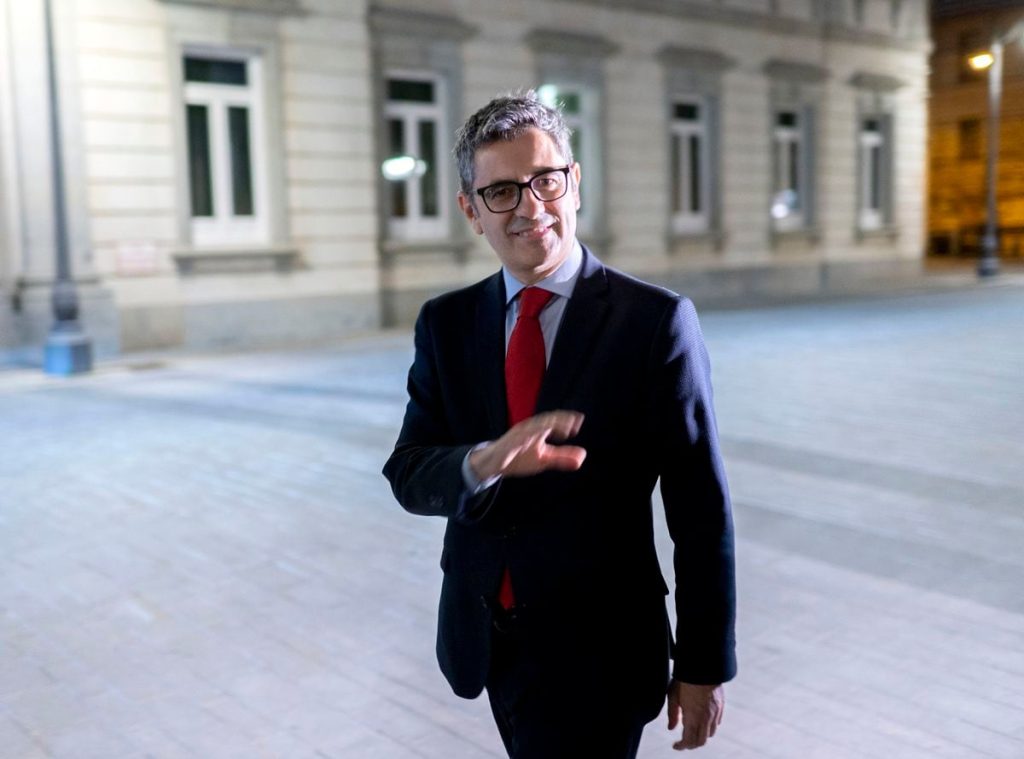The reinforcement of the Supreme Court to address the 25 vacancies it currently faces due to the lack of renewal of the General Council of the Judiciary (CGPJ) has been the focus of the meeting held on Monday between the Minister of the Presidency, Justice and Relations with the Courts, Félix Bolaños, and the Court’s Governing Board. During the meeting, Bolaños announced to the Supreme Court judges the renewal for one year, from June 2024 to June 2025, of the 35 reinforcement lawyers who fill in for the missing judges. The Court’s leadership (composed of the five presidents of the chambers and five other judges chosen by their peers) requested the Justice Minister to maintain this reinforcement plan once the General Council is unblocked because the addition of new judges will not eliminate the backlog of cases that has accumulated in recent years.
The meeting between the Minister and the Governing Board is part of the usual round of meetings that all Justice Ministers usually have when they take office. However, in this case, it comes in the context of recent attacks targeting various judges from the platform of the Congress and the Senate, which have led Bolaños to repeatedly defend the judges. Furthermore, the meeting took place amidst ongoing negotiations between the PSOE and the PP, mediated by the European Commissioner for Justice, Didier Reynders, to renew the CGPJ, whose mandate expired five years ago. While the conversations are currently at a standstill, the Minister expressed confidence that they will bear fruit. This renewal is crucial for the Supreme Court, as it would allow the CGPJ to regain the authority to appoint discretionary positions, enabling the new governing body of the judges to fill the 25 vacancies affecting the Court’s operations.
Government sources indicated at the end of the meeting that the commitment of the Executive to maintain the reinforcement plan until 2025 addresses “the main demand raised by the Supreme Court judges.” The 37 lawyers currently on specialized assignment will also be renewed for the same period. This commitment is intended to demonstrate the Government’s dedication to ensuring the proper functioning of the Judiciary in an exceptional situation that is expected to be resolved soon in the negotiations to renew the CGPJ, with the mediation of the European Commission. The situation has pushed the Public Justice Service to a critical point, according to these sources.
The Minister also informed the Governing Board that the Ministry building located on Génova Street, scheduled to be completed by 2025-2026, will be allocated to the Technical Secretariat of the Court. The meeting underscored the Government’s support for the Supreme Court, emphasizing the importance of institutional respect, cordiality, and collaboration. The Minister reiterated his full support for the judiciary against any politically motivated attacks, whether from independentist environments, the Popular Party, or Vox. Bolaños reaffirmed his commitment to defending the reputation of Spanish judges and magistrates against any attempts at interference.
The attacks on judges and the reactions they have received from the Government were discussed during the meeting between Bolaños and the Supreme Court’s leadership. According to sources present at the meeting, the President of the Criminal Chamber, Manuel Marchena, thanked the Minister for his defense of the judges on multiple occasions but also criticized some instances of silence. Marchena referred to the day when Junts’ spokesperson in Congress, Miriam Nogueras, called several magistrates of the Supreme Court, including Marchena, “indecent” and suggested they should be “dismissed and tried.” Bolaños explained to Marchena that on that particular day, he was at the Senate defending the judges against allegations made by Senator Josep Lluís Cleries from Junts. The Minister assured the Supreme Court magistrates that his defense of the judiciary has become so regular that it sometimes goes unnoticed in the media.
The meeting between the Minister and the Supreme Court focused mainly on operational matters, with no mention of current tensions between the Judiciary and the Executive, such as the amnesty bill or the debate on lawfare, according to sources. The discussion centered on the reinforcements for the Supreme Court, with the Government granting the one-year extension requested by the Court, which currently has 31.25% of its positions vacant (25 out of 79). As of January 1, 2023, the five chambers of the Supreme Court had a total of 46,658 pending cases, representing an increase of over 3,000 cases in the past year (43,620 cases on January 1, 2022).


